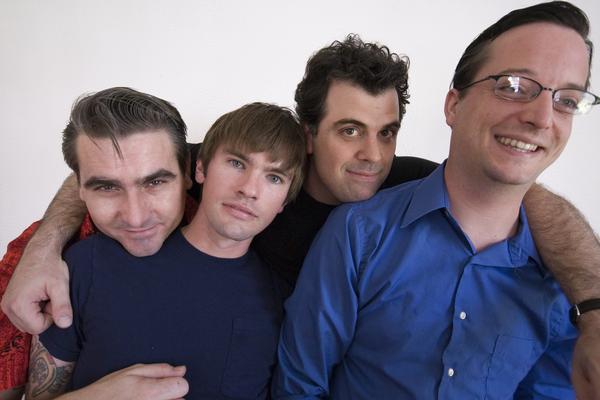|
It’s obvious that the 50’s rockabilly lives deep in the soul of the Bellfuries – how did the band get its start in Austin, TX and how has this new album opened the doors to new fans?
JS: I formed the band after moving here from Cleveland . Our first record , though decidedly different than other albums classified as rockabilly, was just that — a rockabilly record. The new album has opened things up a bit more as far as general audience appeal , but we certainly still have our "rootsy" moments. I dig all types of music, but tend to gravitate towards more structured pop songs. Some people like the new direction, some wanted another " Just Plain lonesome"; either way we needed to move forward.
What was the musical environment like at the time while growing up? Did you always want to be a musician? What was the music that first caught your ear and made you say, "Hey, I want to do this.”?
JS: My Uncle and brother were both Beatles fanatics, completely obsessed with that band . Some of my earliest childhood memories are of us going to Beatles conventions at various hotels in Cleveland. I would hold onto my brothers belt-loop and we would tear our way through the aisles of vendors, it was so exciting for me. I knew at a very young age that I wanted to be a musician, though I didn’t really pick up a guitar until I was about 14 or 15, after hearing Megadeth’s first record " Killing is my Business..", but that’s another story!
What do you find works best for your creative process when bringing a song together? Does it evolve from jams, riffs, lyrics?
JS: The melody is almost always first , but it can happen any number of ways. Lyrics can be a struggle for me, I am more interested in how the chords and melodies work together. Shecky and I usually work out the basic structures before bringing them to the rest of the band.
Where did the title "Palmyra" come from?
JS: It’s the name of the street we used to lived on, and where most of the songs on the record were born.
Is there a song on the album that has special meaning for you? Maybe "Death of an Idol" about a childhood musical hero?
JS: "Death of an idol" is half truth, half fiction. I was inspired to write a song about what happens to these aging musicians who were once idolized and are then forgotten. They fall out of popularity, get regular jobs, and life goes on….or maybe they are crushed by disappointment, bad financial decisions, and broken dreams – as is the case with "Death of an Idol".
Any good experiences on the road you’d like to talk about?
JS: We haven’t yet toured with this line-up. We all have our road tales to tell, but most of them are not fit for public consumption.
Do you plan to play at any music festivals (like International Pop Overthrow) during your tour? Or coming to NY?
JS: Of course we will be coming to New York. As far as festivals go, if there’s one that seems cool, we’ll play it . Speaking for myself and not the rest of the band, I am not really into festivals and prefer seeing bands in clubs or on their own separate tours. It usually feels like you are at an amusement park and not at a show with most of these festivals.
I really enjoyed the music – Any plans yet for a follow-up album?
JS: We have a handful of songs written for the next record, with plans to record early next year.
Thanks for the interview, Joey – I can’t wait to hear the next Bellfuries project.
|
 The Bellfuries
The Bellfuries